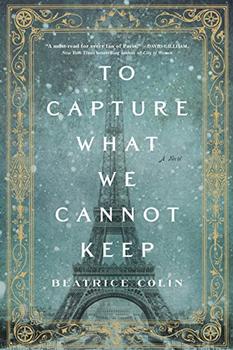Book Club Discussion Questions
In a book club? Subscribe to our Book Club Newsletter!
Please be aware that this discussion guide will contain spoilers!
- Discuss the novel's epigraph, by Gustave Eiffel: "Before they meet at such an impressive height, the uprights appear to spring out of the ground, molded in a way by the action of the wind itself." What sort of tone does the epigraph establish? How does it resonate with the novel that follows?
- Caitriona is very much a woman constrained—by her status as a widow, by her poverty and her fall from high society, even by the clothes she wears. In our introduction to her, on the novel's first page, Beatrice Colin writes, "She had laced tight that morning, pulling until the eye holes in her corset almost met, and now her chest rose and fell in shallow gasps as she tried to catch her breath—in, out, in and out." Were you therefore surprised by how her story turned out?
- Jamie describes Cait as "a lady with real class," despite the fact that she is penniless. Discuss the complex and nuanced portrayal of class in To Capture What We Cannot Keep. How is class tied to material wealth, education, social status, and family? How do the classes mix in the novel, and what is the fallout?
- Eiffel tells Émile, of Paris, "reputation in this city is everything, you know that." How does reputation shape the lives of Colin's characters?
- During a sightseeing boat trip in Paris, Alice "watch[es],with a mixture of horror and delight, as one of the women, still with a glass of red wine in one hand, pulled up her skirts to reveal purple bloomers and danced alone on the deck." Discuss how Alice is frequently pulled between social propriety and Bohemian freedom. Does her character evolve over the course of the novel?
- It's clear that all of Colin's characters are participating in sexual adventures. Yet as Jamie and the count show, the men seem immune to any censure while for the women, it can be their ruin. Does this double standard surprise you? Do you think things are much different today than they were back then?
- Why is Gabrielle so devastated when she discovers that it was Émile who bought all of the paintings of her? When she laments, "I thought, I thought that at last all this meant something," what does it reveal of her insecurities about her romantic life and her artistic legacy?
- Do you find Gabrielle likable or sympathetic? Did your opinion of her change as the novel progressed? Discuss your feelings on the likability of the characters in general.
- Discuss the important role the Parisian art world plays in the novel. Were you surprised at the contemporary reactions to now-beloved Impressionist painters? How does the aesthetic of the Eiffel Tower fit in (or clash) with Impressionism?
- Émile believes that, in his art class, "his style was the exact opposite of his technical work; his line was loose, economical, free. And he wanted to capture what he couldn't keep, the fleeting, the transient." He believes, of his engineering, that "there was finesse in his composition of girders and blots; it was bold and brilliant, it was art." How do these two artistic passions shape him? How do they complement his attraction to both Cait and Gabrielle? What does the novel's title mean to you? How do you think it speaks to the other characters in the novel?
- Why do you think Émile's mother holds such sway over him? What does she represent in the novel?
- Discuss this conversation between Cait and Émile, about the Eiffel Tower: "But the fact is that it is not trying to be anything rather than what it is. Nothing is hidden and the reverse is also true; nothing in the city can hide. From the top on a clear day, you will be able to see everything. It will all be gloriously transparent." "It's what we want, isn't it?" she said. "Transparency. One so rarely finds it." What is the symbolic importance of the Eiffel Tower in the novel, and in Émile and Cait's relationship?
- To Capture What We Cannot Keep moves between Glasgow, Paris, Edinburgh, and West Africa. How are the characters affected by setting, and how is a sense of place evoked in the writing?
- Were you surprised that Cait moved to West Africa? What do you think her future holds
Unless otherwise stated, this discussion guide is reprinted with the permission of Flatiron Books.
Any page references refer to a USA edition of the book, usually the trade paperback version, and may vary in other editions.
